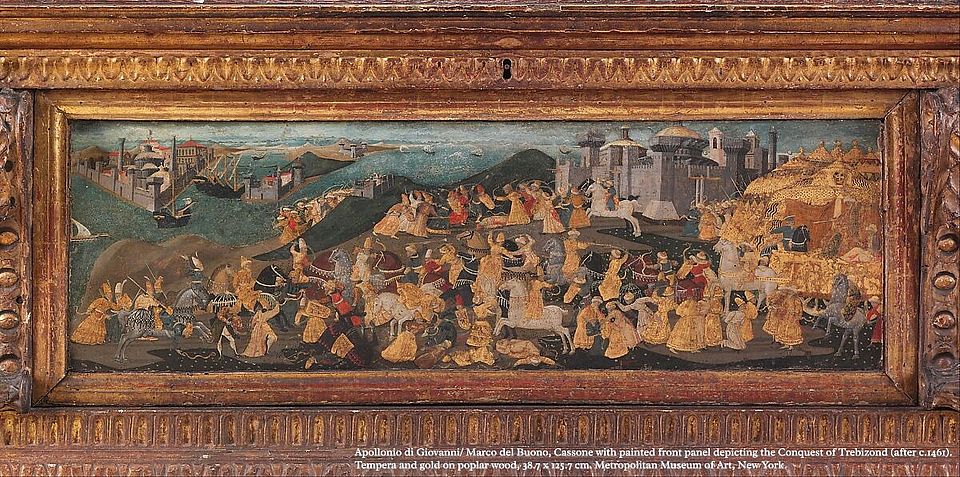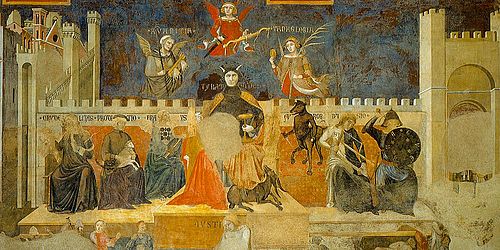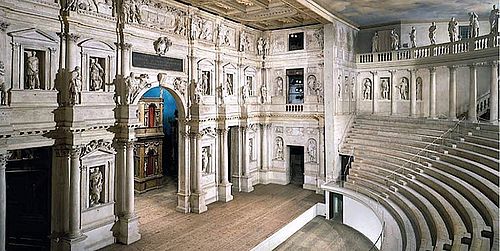Das Kolloquium versteht die Renaissance als doppelgesichtigen Projektionsraum: Als Epochenkonzept sowie als Reflexionskategorie, als Zeitraum, in dem wir den Beginn der Moderne lokalisieren und zugleich seine ständig wachsende Fremdheit konstatieren, aber auch als Chance, die für die historischen Wissenschaften zentrale Epochengrenze zwischen Mittelalter und Neuzeit weiter zu dynamisieren. Aus materiellen wie wissenschaftsgeschichtlichen Gründen liegt dabei der Fokus auf dem 14. bis 17. Jahrhundert.
Im FS 2026 findet kein Basler Renaissancekolloquium statt.
Das Basler Renaissancekolloquium bietet mit thematisch ausgerichteten Veranstaltungen Gelegenheit zum interdisziplinären Gespräch zwischen allen Fächern, die an historischen Transformationsprozessen, Fragen der Traditionsbildung und an der Konstruktion historischer Typologien interessiert sind. Als interdisziplinär ausgerichtete Veranstaltung wird das Basler Renaissancekolloquium vom Departement Geschichte (Lucas Burkart) und dem Kunsthistorischen Seminar (Aden Kumler) getragen; es ist Teil des Angebots der Basel Graduate School of History.
Begründet wurde das Basler Kolloquium im Wintersemester 2005/06 als überregional ausgerichtetes Diskussionsforum und auf Initiative von Prof. em. Dr. Susanna Burghartz, Prof. em. Dr. Achatz von Müller und Prof. Dr. Andreas Beyer.
Basler Renaissancekolloquium
Departement Geschichte
Hirschgässlein 21
CH-4051 Basel
Tel: +41 61 207 46 66
renaissance@unibas.ch
57. Basler Renaissance Kolloquium – "Renaissance (Dis)possession"
14. November 2025, 14h15 - 18h30
Departement Geschichte, Seminarraum 1, Hirschgässlein 21, 4051 Basel
Outline
The nature of possession in the Renaissance was to be contested. How could it have been otherwise? A rising merchant class owned more things than ever before, but emergent credit systems led to ruinous loss and repossession. A fractious and divided church alternatively clung to and purged worldly goods, finding new uses for buildings and grounds. The idea of self-possession was articulated as inherent to humanity even as it was denied to an ever-larger number of enslaved individuals. Imperial claims were staked not only through force but also by simple assertion, dispossessing indigenous communities of ancestral lands. Evolving notions of authorship meant that something as immaterial as an idea came to be considered a product of the self, which could unjustly be taken by others. In all of these domains, declarations were met with counter-arguments in constant (re)negotiations of claims of rightful ownership.
The 57th Basel Renaissance Colloquium seeks to reevaluate processes of possession and dispossession. Though the legal sphere often provided a theater in which Renaissance dramas of claim and counter-claim played out, and while this period saw plenty of outright theft, the Colloquium will not focus primarily on legal definitions and decisions. Rather, we are interested in how contesting rights of (dis)possession in the Renaissance revealed or produced epistemological fissures in the “who, what, where, when, and why ” of rightful possession in the first place. Possessions could easily become embroiled in dispute simply because the actions of owning, saving, hiding, or retaining were incongruently understood by different groups or within divergent segments of the social fabric. In turn, the very notions of, conceptual frame-works for, and practices of (dis)possession will be our principal concern.
The discrepancies in perceiving and constructing legitimacies around rightful ownership open onto broad historical questions: how were notions of (self-)possession understood, shared, extended, or withdrawn? Under which circumstances was the very idea of possession disavowed or rejected out of hand? How did certain groups assert affiliation to, and singular inheritance of, previous artistic and philosophical traditions? What can incompatible legal codes and daily practices around enslavement reveal about contemporary conceptions of the human? How did conflict in colonial spaces reveal alternative conceptions of property? And what modes of representation produced either durable or contestable claims to ownership?
Renaissance (Dis)possession is intended as an interdisciplinary forum open to (and seeking to combine) social, political, intellectual, and art historical methods. The colloquium will allow for individual presentations of about 30 minutes in length, followed by questions and a final roundtable discussion.
Owning the River: Possession, Power and the Environment in Renaissance Italy
Luca Zenobi, University of Edinburgh
From trade to slavery and from identity to religion, the language and culture of possession permeated every aspect of Renaissance life. This paper explores its place in politics and diplomacy, and particularly in how Italian regimes identified the extent of their territorial holdings. Drawing from a larger study on the role of rivers in the geopolitics of the time, it shows that watercourses were not used merely as spatial markers; they were also appropriated in their entirety and folded into the bundle of possessions that defined a dominion. The paper examines the challenges and opportunities that emerged when applying this patrimonial logic to the natural world, while also attending to the agency of rivers themselves as forces that defied ownership and invited acts of repossession — or indeed, dispossession. In tracing how rivers both underpinned and unsettled the ambitions of Renaissance rule, the paper makes a case for a more dynamic understanding of pre-modern territoriality: one grounded not in permanence, but in constant bargaining, adaptation and literal flow. Rivers, it argues, expose the contradictions behind the claim to power over space, laying bare the tension between political imagination and ecology — between human fictions and the realities they sought to encompass.
Aesthetic Excess and (Dis)possession in Indigenous Maps of New Spain
Barbara E. Mundy (Tulane University, New Orleans)
Across sixteenth-century New Spain, Indigenous individuals and communities contested encroachment or seizure of their lands in courts, thereby taking advantage of a new, but not entirely novel, system of justice introduced by Spanish Habsburg rulers. Often, they buttressed their claims with property maps, called pinturas in the archival record. While a simple sketch map would have met the legal standard, Indigenous property maps were sometimes elaborate paintings, dense with multi-hued pigments, their artists deploying various systems of projection in their representations of contested territory. They were, in short, aesthetically excessive.
This paper looks at the relationship between aesthetic excess and possession. It centers on Indigenous maps (pinturas) produced for court cases, their anomalous presence in the archival record rupturing the otherwise even cadence of the textual claims. It seeks to explain the value of such Indigenous aesthetic experiments, expressed in the maps' formal and chromatic features, within contests over possession. Rather than seeing aesthetic excess as an indicator of community prestige, it argues that pinturas made an Indigenous system of knowledge about the land visible. In doing so, they reveal an fundamental disjunction between Hapsburg ideals of rightful possession and those of their subjects in the Indies
Possession by Category in Renaissance Italy: What Does Actual Ownership of Goods Reveal About the Meaning of Possession?
Kate Lowe (Queen Mary, University of London)
The notion of possession was central to all aspects of life in Renaissance Italy, and ownership as an idea was completely accepted, even if particular examples of who owned what were contested. Renaissance goods can easily be separated into inanimate and animate, and animate goods can easily be further separated into animals and humans. But did possession (or ownership) of all these categories of goods imply that they were conceptualised at the time as similar or equivalent, or was it still entirely clear that they were all different? This paper will analyse the types of evidence from Renaissance Italy that can be used to address these questions – documentary, object-based, textual, visual – in an attempt to clarify what possession signified, and how the realities of the act of ownership could override both forms of morality and ideas of legality. The main focus will be on Florence but there will also be material from Northern Italian courts and from the papal court. Particular attention will be paid to the intersection of possession with wealth and status; in addition to generating the most evidence, these intersections usually provide the clearest lines of demarcation, and thus permit very fruitful interrogation.
Veranstaltungsarchiv
| BRK56 | «Renaissance of War» | 04. April 2025 | Programm |
| BRK55 | «Renaissance of Diplomacy» | 13. Dezember 2024 | Programm | Abstracts |
| BRK54 | «Secret Renaissance» | 14. Mai 2024 | Programm | Abstracts |
| BRK53 | «meta-renaissance(s)» | 3. November 2023 | Programm | Abstracts |
| BRK52 | «Renaissance Properties» | 5. Mai 2023 | Programm | Abstracts |
| BRK51 | «Dark Renaissance» | 2. Dezember 2022 | Programm | Abstracts |
| BRK50 | «Renaissance Patterns – Muster der Renaissance» | 20. Mai 2022 | Programm | |
| BRK49 | «Geologie der Renaissance» | 23. April 2021 | Programm | |
| BRK48 | «Die Renaissance – eine Begriffsdiskussion» | 11. Dezember 2020 | Programm | Bericht |
| BRK47 | «African Renaissance» | 2. Oktober 2020 | Programm |
| BRK46 | «Gerüstete Renaissance» | 13. Dezember 2019 | Programm | Bericht |
| BRK45 | «Renaissance Underground» | 18. Oktober 2019 | Programm | Bericht |
| BRK44 | «Travel, Maps and Ethnography» | 24. Mai 2019 | Programm | Bericht |
| BRK43 | «Verschleierte Renaissance» | 14. Dezemer 2018 | Programm | Bericht |
| BRK42 | «Tiere» | 19. Oktober 2018 | Programm | Bericht |
| BRK41 | «Fashionable Renaissance» | 10. November 2017 | Programm | Bericht |
| BRK40 | «Reformation und Renaissance» | 21. April 2017 | Programm | Bericht |
| BRK39 | «Athletische Renaissance – Sport und Jagd in der frühen Neuzeit» | 28. Oktober 2016 | Programm | Bericht |
| BRK38 | «Renaissance Books - A Mediology» | 11. März 2016 | Programm | Bericht |
| BRK37 | «Globalizing the Renaissance - New Perspectives» | 4. Dezember 2015 | Programm | Bericht |
| BRK36 | «Autorenschaft und Person» | 8. Mai 2015 | Programm | Bericht |
| BRK35 | «Ungleichheiten» | 6. März 2015 | Programm | Bericht |
| BRK34 | «Körper und Herrschaft» | 14. November 2014 | Programm | Bericht |
| BRK33 | «Schiffbruch: Erfolgsgeschichten des Scheiterns» | 3. Oktober 2014 | Programm | Bericht |
| BRK32 | «Fundamente der Moderne» | 16. Mai 2014 | Programm | Bericht |
| BRK31 | «Talking about Desire - Writing the Renaissance» | 7. März 2014 | Programm | Bericht |
| BRK30 | «Schauplatz Buch: Vernetzung und Zirkulation» | 13. Dezember 2013 | Programm | Bericht |
| BRK29 | «Invidia – ein Affekt zwischen Ökonomie und Moral» | 18. Oktober 2013 | Programm | Bericht |
| BRK28 | «Vermessungen» | 17. Mai 2013 | Programm | Bericht |
| BRK27 | «Briefgefühle» | 15. März 2013 | Programm | Bericht |
| BRK26 | «Schöne Gesellschaften? Asymmetrie und Vollkommenheit» | 14. Dezember 2012 | Programm | Bericht |
| BRK25 | «trading zones – contact zones – entanglement. Theorien und Konzepte auf dem Prüfstand» | 12. Dezember 2012 | Programm | Bericht |
| BRK24 | «Wissensordnungen» | 25. Mai 2012 | Programm | Bericht |
| BRK23 | «Verzeitlichung» | 27. April 2012 | Programm | Bericht |
| BRK22 | «Das Wissen der Sammler» | 2. Dezember 2011 | Programm | Bericht |
| BRK21 | «Renaissance décentrée - dezentrierte Renaissance» | 7. Oktober 2011 | Programm | Bericht |
| BRK20 | «Epoche - Mythos - Konzept» | 3. Juni 2011 | Programm | Bericht |
| BRK19 | «Luxuroius Renaissance» | 1. April 2011 | Programm | Bericht |
| BRK18 | «Konsum und Geschäft - Consumer‘s Renaissance» | 3. Dezember 2010 | Programm | Bericht |
| BRK17 | «Buchgeld - Die Versprechungen der Hypnerotomachia Poliphili» | 29. Oktober 2010 | Programm | Bericht |
| BRK16 | «Gelehrtenkultur und Wissenspraxis» | 28. Mai 2010 | Programm | |
| BRK15 | «Fragile Männlichkeit» | 10. März 2010 | Programm | Bericht |
| BRK14 | «Räume der Renaissance» | 13. November 2009 | Programm | Bericht |
| BRK13 | «Renaissance und Religion» | 25. September 2009 | Programm | Bericht |
| BRK12 | «Körper - Natur - Wissenschaft» | 12. Dezember 2008 | Programm | Bericht |
| BRK11 | «Renaissancismus» | 17. Oktober 2008 | Programm | |
| BRK10 | «Das Mittelmeer: Kontakt- oder Konfliktraum?» | 23. Mai 2008 | Programm | Bericht |
| BRK9 | «Konzil und kulturelle Kommunikation» | 4. April 2008 | Programm | Bericht |
| BRK8 | «Kulturelle Austauschprozesse in der Renaissance» | 14. Dezember 2007 | Programm | Bericht |
| BRK7 | «Renaissance als internationaler Modernisierungsprozess» | 19. Oktober 2007 | Programm | Bericht |
| BRK6 | «Die Renaissance der Anderen?» | 19. April 2007 | Programm | Bericht |
| BRK5 | «Paradigma Antika» | 8. Dezember 2006 | Programm | |
| BRK4 | «Kunstpatronage: Neue Forschungsperspektiven» | 22. Juni 2006 | Programm | |
| BRK3 | «Identität und Differenz: Kostüm und Nacktheit» | 28. April 2006 | Programm | |
| BRK2 | «Die Renaissance und der Norden» | 27. Januar 2006 | ||
| BRK1 | «Renaissance heute – eine wissenschaftskritische Terrainerkundung» | 9. Dezember 2005 | Programm |



